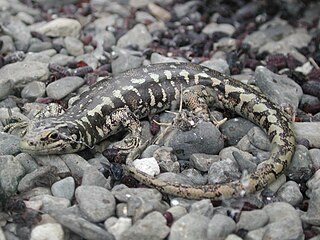
Oligosoma is a genus of small to medium-sized skinks found only in New Zealand, Norfolk Island and Lord Howe Island. Oligosoma had previously been found to belong to the Eugongylus group of genera in the subfamily Lygosominae; the Australian genus Bassiana appears to be fairly closely related.

The Otago skink is a rare, endangered species of large skink in the family Scincidae, found in the rocky canyons and grassy patches of Central Otago, New Zealand.

Zealandia, formerly known as the Karori Wildlife Sanctuary, is a protected natural area in Wellington, New Zealand, the first urban completely fenced ecosanctuary, where the biodiversity of 225 ha of forest is being restored. The sanctuary was previously part of the water catchment area for Wellington, between Wrights Hill and the Brooklyn wind turbine on Polhill.

The grand skink is an endangered species of large skink endemic to the central Otago region of New Zealand.

McGregor's skink is a species of lizard in the family Scincidae. The species is endemic to New Zealand.

Falla's skink or the Three Kings skink is a species of lizard in the family Scincidae.
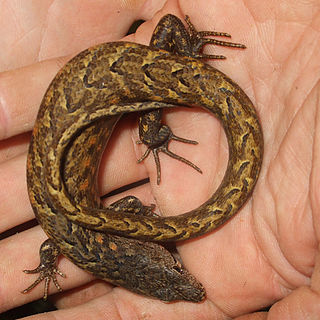
The chevron skink, is a large species of skink endemic to New Zealand, found only on Great and Little Barrier islands in the Hauraki Gulf. A cryptic forest dweller, it can hide underwater, and is under threat from introduced rats.
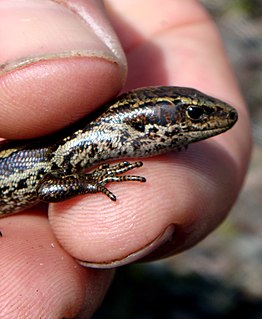
Oligosoma infrapunctatum, the speckled skink, is a species of skink in the family Scincidae. It is endemic to New Zealand.
The small-scaled skink is a species of skink in the family Scincidae. The first specimen was captured in 1971 on Motutaiko Island, Lake Taupō but it is now known to be endemic to the central North Island of New Zealand in small population pockets. The holotype is in the collection of the Museum of New Zealand Te Papa Tongarewa.

Oligosoma nigriplantare, the Chatham Islands skink, is a species of skink in the family Scincidae.
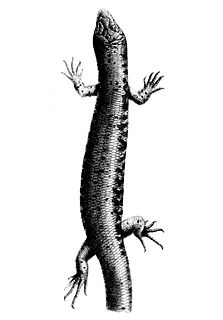
Oligosoma suteri, known commonly as Suter's skink, the black shore skink, the egg-laying skink, and Suter's ground skink, is a species of lizard in the family Scincidae. The species is endemic to New Zealand.
Oligosoma taumakae, the Open Bay Island(s) skink, or Taumaka skink, is a species of skink. It was described from the Open Bay Islands, off the west coast of the South Island of New Zealand.
Hardy's skink is a species of skink, a lizard in the family Scincidae. The species is endemic to the Poor Knights Islands of New Zealand.
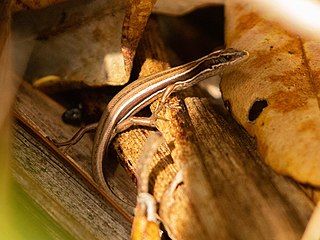
The moko skink is a species of lizard in the family Scincidae (skinks) that is endemic to New Zealand. Moko is the Māori word for lizards in general.

Anthony Hume Whitaker was a New Zealand herpetologist, contributing a 50-year career of fieldwork, pioneering research and species discoveries. His is still the largest collection of reptile and amphibian specimens donated to Museum of New Zealand Te Papa Tongarewa.

The Burgan skink is a nationally endangered species of skink native to New Zealand. It was described from a specimen found near the Burgan Stream, in the Rock and Pillar Range, Central Otago.

The cryptic skink is a nationally vulnerable species of skink native to New Zealand.
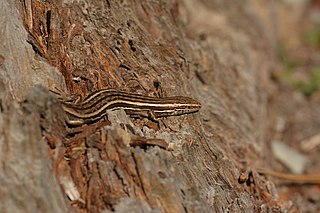
The McCann's skink is a species of skink native to New Zealand.

The common skink, also known as the northern grass skink, is a species of skink native to New Zealand. Although historically classified as a subspecies of Oligosoma nigriplantare, it is likely to be given separate species status as data suggests it is a distinct species.

The brown skink is a species of skink native to New Zealand.















